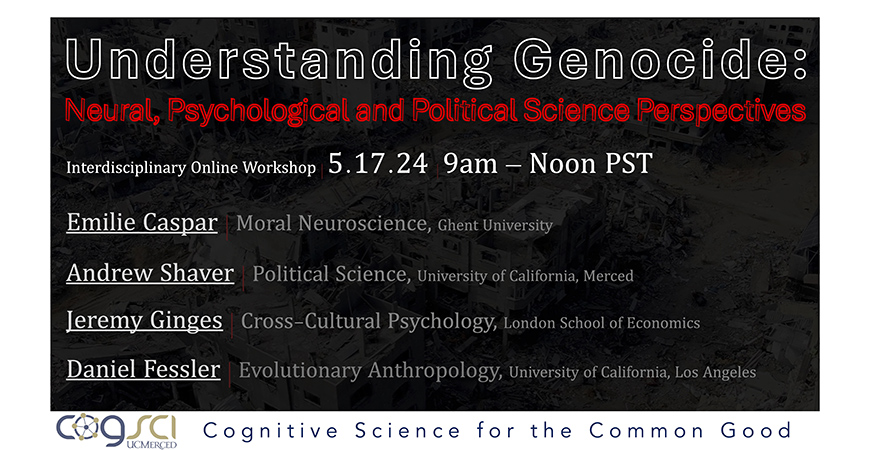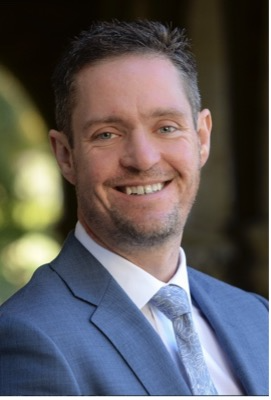
Understanding Genocide:
Neural, Psychological and Political Science Perspectives
Interdisciplinary Online Workshop | 5.17.24
The Department of Cognitive and Information Sciences recently organized an online workshop, “Understanding Genocide: Neural, Psychological and Political Science Perspectives,” which was held Friday, May 17,2024. Drawing on research from moral neuroscience, psychology, political science, and evolutionary anthropology, the panelists focused on key determinants of both genocide and resistance to genocide.
The interdisciplinary panel of scholars included:

Moral Neuroscience
Ghent University
Title: From Qualitative Interviews with Genocide Perpetrators to the Neuroscience of Obedience
Abstract: It is no longer necessary to establish that human beings will follow immoral orders, even in cold blood. As Howard Zinn pointed out, "historically, the most terrible things - war, genocide, and slavery - have resulted not from disobedience, but from obedience" (Zinn, 1997). Beyond historical events, experimental research has also highlighted the human tendency to obey orders that could cause serious harm to others (Milgram, 1963). Decades after Stanley Milgram's foundational studies, a neuroscientific perspective on obedience has emerged, aiming to understand how obeying orders can pave the way for moral transgressions and antisocial behavior towards others. Highlighting recent research using electrophysiological techniques and neuroimaging, paralleled with interviews conducted with former genocidaires in Rwanda and Cambodia, the main findings indicate that obedience to orders modifies cognitive and affective processes compared to freely decided actions. These studies aim to provide an understanding of the neural mechanisms associated with moral transgressions under the influence of authority.

Political Science
UC Merced
Title: Tracking Political Violence and Persecution Globally: Limitations and Opportunities
Abstract: Contemporary studies of political violence depend significantly on incident-level data derived primarily from major national/international news media reports. More generally, the major news media serve a primary source of information on international affairs for the public and international affairs elite alike. Critically, many major international issues (including various ongoing conflicts) receive limited news media attention, with direct implications for whether the public and policy elite are aware of and how they perceive various ongoing global crises as well as whether/how governmental, intergovernmental and international non-governmental organizations respond to them.

Cross-cultural Psychology
London School of Economics
Title: The Role of Hate in Promoting Genocide
Abstract: In this talk I will explore the role of hate in motivating genocide. When witnessing acts of extreme violence, it is tempting to believe that the violent group is motivated by hate. Drawing on several lines of empirical research I will offer an alternative perspective: that extreme violence may be motivated by the belief that the other group hates us. This belief can give rise to the idea that violence is a righteous response to existential threat, and lead to violence that is relatively insensitive to material consequences.

Evolutionary Anthropology
UCLA
DISCUSSANT
Following a brief introduction to the workshop, Professors Caspar, Shaver and Ginges delivered 30-minute talks followed by Q & A sessions with invited colleagues.
Next, as Discussant, Professor Fessler highlighted and integrated key themes and findings presented in the talks, and situated them within an evolutionary theoretical framework.
The workshop concluded with a panel discussion moderated by CIS Professor Colin Holbrook.
The workshop has been archived and may be viewed on Youtube.
This event was organized by the Cognitive Science for the Common Good departmental initiative at UC Merced.




